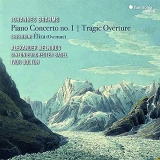Mit schönen, warmen Farben und viel innerer Spannung in einem eher breiten musikalischen Fluss verleiht Igor Bolton der Tragischen Ouvertüre eine interessante Darstellung und sorgt so schon mal für einen guten Start auf dieser CD von Harmonia Mundi. Die warmen Farben und eine bedeutsame Rhetorik sorgen auch in der langen Orchestereinleitung des Ersten Klavierkonzerts für Aufmerksamkeit, ehe Alexander Melnikov auf einem exzellent klingenden Blüthner Grand Piano von ca. 1859 nicht weniger warme Farben kredenzt. Beide, der Dirigent und der Solist, lassen die ruhigeren Passagen dieses ersten Satzes sehr nachdenklich und ausdrucksvoll werden, ohne dass es den aufgewühlten Teilen an Kraft fehlen würde.
Im langsamen Satz mangelt es für mein Empfinden etwas an Spannung, aber das Finale ist alert und farbig, wenn auch nicht so packend wie in vielen anderen Interpretationen. Insgesamt ist dies also eine gute, wegen des verwendeten Flügels sicher auch interessante, aber keineswegs herausragende Interpretation.
Das sehr gute spielende Sinfonieorchester Basel interpretiert dann noch unter Ivor Bolton die Ouvertüre zu Cherubinis komischer Oper Eliza, ou Le voyage aux glaciers du Mont St Bernard, in welcher der Komponist den Handlungsort, die Alpen hörbar macht.
With beautiful, warm colors and plenty of inner tension in a rather broad musical flow, Igor Bolton gives the Tragic Overture an interesting performance and gets things off to a good start on this Harmonia Mundi CD. The warm colors and significant rhetoric also command much attention in the long orchestral introduction to the First Piano Concerto, before Alexander Melnikov serves up no less warm colors on an excellent-sounding Blüthner Grand Piano of circa 1859. Both conductor and soloist make the quieter passages of this first movement very reflective and expressive, without lacking power in the more agitated sections.
The slow movement lacks a bit of tension for my taste, but the finale is alert and colorful, if not as gripping as in many other interpretations. Overall, then, this is a good interpretation, certainly interesting because of the grand piano used, but by no means outstanding.
The very well playing Basel Symphony Orchestra under Ivor Bolton then interprets the overture to Cherubini’s comic opera Eliza, ou Le voyage aux glaciers du Mont St Bernard (Eliza, or The Journey to the Glaciers of Mont St Bernard) in which the composer makes the opera’s set, the Alps, audible.
























